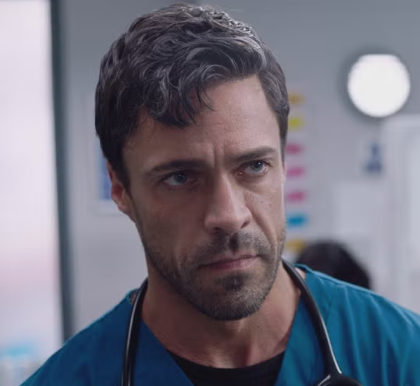The Holby City Emergency Department has been plunged into an unprecedented period of upheaval with the arrival of Flynn Byron, the hospital’s new Clinical Lead. Byron, whose appointment followed a tumultuous personal chapter involving a horrific accident and the revelation of his affair, which impacted his relationship with his father-in-law and fellow surgeon, Russell, immediately set about implementing radical changes that sent ripples of discontent and confusion throughout the department. His return to Holby, two months after his recovery and revelation of the affair, saw him confidentially inform his old friend Stevie that he would be taking the helm, foreshadowing the dramatic shift in power dynamics.
Flynn’s inaugural shift was a baptism by fire, as he discovered the ED in its perpetual state of controlled chaos – a daily reality for the dedicated medical team. Undeterred, he wasted no time in unveiling his new, controversial mandate: patients requiring admission would bypass the ED entirely and be sent directly to the hospital wards. This directive, designed to streamline patient flow and alleviate pressure on the overburdened emergency department, was met with immediate resistance and skepticism from the nursing staff and doctors alike. The seasoned professionals, accustomed to a system that prioritised immediate, comprehensive assessment in the ED before transfer, foresaw the potential for dire consequences. Yet, amidst the general reluctance, junior doctor Tariq Hussein, perhaps eager to impress or genuinely convinced of the innovative approach’s efficacy, expressed his full support for Flynn’s ambitious overhaul.
However, Flynn’s bold vision quickly alienated other departments. The wards, unprepared for the sudden influx of directly admitted patients, found themselves overwhelmed and under-resourced, leading to a severe shortage of available beds. This created a perilous bottleneck, trapping patients in corridors and reception areas as the hospital struggled to cope with the new, disjointed flow. Jodie Whyte, one of the ED’s dedicated nurses, found herself caught in an agonizing ethical bind, torn between adhering to Flynn’s new protocols and Russell’s unwavering insistence on patient safety and traditional, thorough care. The conflict highlighted the growing chasm between administrative directives and the practical realities of frontline medical practice.

The tension escalated dramatically when Tariq, attempting to navigate the new system and presumably clear the overcrowded reception, made a critical, life-altering misjudgment. In the midst of the escalating chaos, patient Gloria was inadvertently left unattended in the reception area. Tariq’s oversight, compounded by the general disarray and the inherent flaws of Flynn’s system, would prove fatal.
Russell, witnessing the unfolding disaster and armed with the personal leverage of Flynn’s past betrayal, seized the opportunity to directly confront the new Clinical Lead. He vehemently criticised Flynn’s ‘big changes’, accusing him of endangering patients and sacrificing established protocols for untested theories. Flynn, though initially defensive of his actions, found himself on the back foot as Russell chillingly reminded him of his “major betrayal” – a veiled threat that underscored the deep-seated personal animosity festering beneath their professional disagreements. The weight of this personal history, combined with the visible deterioration of patient care, forced Flynn to temporarily backtrack on his orders, acknowledging, albeit begrudgingly, that his plan was indeed “upsetting other wards.” This concession, however, only served to frustrate Tariq, who had enthusiastically championed the new approach and now saw his efforts, and perhaps his judgment, undermined.
The situation spiraled further downwards with the horrifying discovery of Gloria’s lifeless body in the reception area. Her tragic death served as a stark and undeniable indictment of the chaos that Flynn’s new policies had unleashed. The incident triggered an immediate internal inquiry, prompting Flynn to convene a tense meeting with his team, ostensibly to determine “what had gone wrong.” In a desperate attempt to deflect blame and protect himself, Tariq, panicked and overwhelmed by guilt, tried to pin the responsibility on the nursing staff. However, the bitter truth was undeniable: his own grave mistake, compounded by the flawed system, had directly led to Gloria’s death.

The confrontation that followed between Flynn and Tariq was explosive and deeply personal. Flynn, still reeling from the professional fallout of Gloria’s death and perhaps looking for a scapegoat, vehemently accused Tariq of “bucking responsibility.” The argument quickly escalated, culminating in Flynn making the shocking and immediate decision to fire Tariq on the spot. While it was quickly established that Flynn, as Clinical Lead, did not possess the unilateral authority to dismiss a doctor without due process, the sheer force of the confrontation and the weight of his guilt over Gloria’s death propelled Tariq to make a life-altering decision. Rather than fighting for his position, he declared his intention to quit, an abrupt and definitive end to his tenure at Holby.
In the aftermath, seeking a complete escape from the trauma and professional disgrace, Tariq made plans to pursue a job opportunity in Dubai, envisioning a fresh start far away from the shadows of Holby. He extended an invitation to his cousin, Rash, urging him to join him on this new adventure. However, it quickly became clear that Rash’s heart remained firmly rooted in Holby, inextricably linked to his patients, his colleagues, and the challenging but fulfilling environment of the ED. Rash’s decision to stay underscored a fundamental difference between the cousins – Tariq’s impulse to flee from his mistakes versus Rash’s deep-seated commitment to his vocation and community. Thus, Tariq departed the ED alone, leaving behind a department still reeling from his tragic error, Flynn’s divisive leadership, and the profound questions raised about the true cost of systemic change. His exit, unexpected and abrupt, left a palpable void and signaled a new, uncertain chapter for the Holby City Emergency Department, now firmly under the controversial direction of Flynn Byron.





